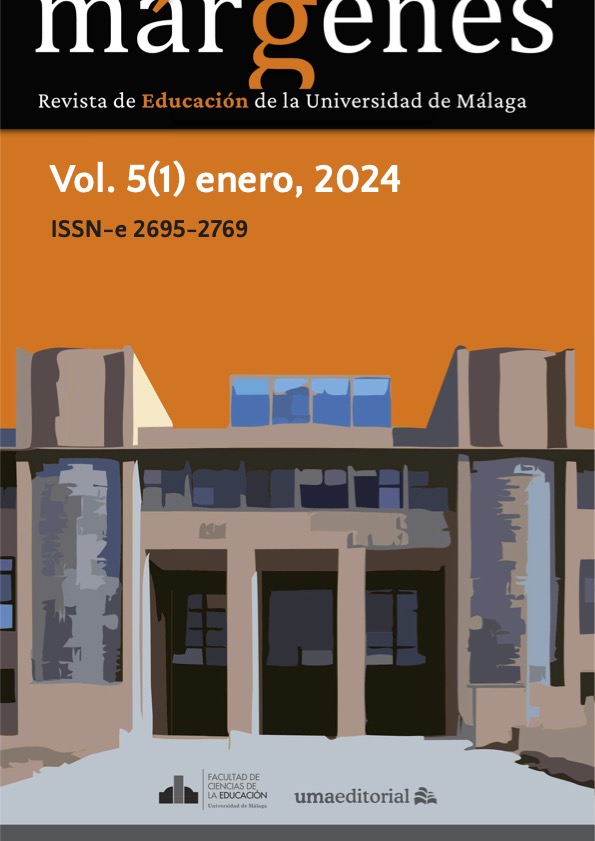Education and Life's Meaning
DOI:
https://doi.org/10.24310/mar.5.1.2024.17428Keywords:
education, pedagogy, meaning of life, simplicity, emotional education, ideal, motivationAbstract
Currently, society is immersed in a technological fascination that transforms the human experience. The contemporary individual is digital and transhuman, seeking virtual connection but lacking real human contact. This phenomenon generates a "smart" model of the human being that distances him from the encounter and avoids the great questions of humanity. Despite these changes, the search for the meaning of life has persisted throughout history. Religions and even atheistic spirituality recognize a transcendence that goes beyond visible reality. In the educational field, it is essential to address this search for meaning since no exhaustive explanation of existence is limited to what is apparent. The "meaning of life" transcends mere linguistic or anatomical meanings, encompassing perception, dynamic meaning, intentional direction, and values. This sense is configured through interconnected actions and is enriched in extreme situations, promoting internal growth. Ultimately, the human purpose is related to moral, cultural, and spiritual life, and educating in this sense of existence is essential for an integral and enriching formation. This essay proposes two approaches to the meaning of life: 1) as a subjective, individual, or collective purpose; and 2) as self-realization and full life. And it proposes four areas of educational action: learning from simplicity, educating emotions, cultivating love and friendship, and motivating to lead a life of ideals.Downloads
Metrics
Publication Facts
Reviewer profiles N/A
Author statements
Indexed in
-
—
- Academic society
- N/A
- Publisher
- Universidad de Málaga
References
Bunge, M. (1976). El ser no tiene sentido y el sentido no tiene ser: notas para una conceptología. Teorema: Revista internacional de filosofía, 6(2), 201-212. https://dialnet.unirioja.es/servlet/articulo?codigo=2046485
Camus, A. (2005). La peste. Libresa.
Comte-Sponville, A. (2006). El alma del ateísmo. Introducción a una espiritualidad sin Dios. Paidós.
Constitución Pastoral. (2021). Gaudium et spes. Vol.5, 31. Espíritu.
Diéguez, A. (2017). Transhumanismo: la búsqueda tecnológica del mejoramiento humano. Herder Editorial.
Freire, P. (2010). Cartas a quien pretende enseñar (Vol. 2). México DF: Siglo XXI.
Goleman, D. (2010). La práctica de la inteligencia emocional. Editorial Kairós.
Güell, M., y Barceló, M. G. (2013). ¿Tengo inteligencia emocional?: 30 preguntas y 29 respuestas. Grupo Planeta (GBS).
Han, B. C. (2022). La sociedad del cansancio. Herder Editorial.
Kreimer, R. (2008). El sentido de la vida. Longseller.
López Quintás, A. (2003). La cultura y el sentido de la vida. Rialp.
Merton, T. (1982). Acción y contemplación. Editorial Kairós.
Platón. (2020). Apología de Sócrates. Traducción, análisis y notas de Alejandro Vigo. Editorial Universitaria de Chile.
Punset, E. (2014). El viaje a la felicidad. Planeta.
Ryan, R., y Deci, E. L. (2000). La Teoría de la Autodeterminación y la Facilitación de la Motivación Intrínseca, el Desarrollo Social y el Bienestar. American psychologist, 55(1), 68-78. https://kibbutz.es/wp-content/uploads/2000_ryandeci_spanishampsych.pdf
Sádaba, J. (1981). ¿Tiene sentido preguntarse por el sentido de la vida?. Teorema: Revista Internacional de Filosofía, 11(2/3), 179-195. https://dialnet.unirioja.es/servlet/articulo?codigo=2045660
Schinkel, A., De Ruyter, D., y Aviram, A., Education and Life's Meaning, Journal of Philosophy of Education, Volume 50, Issue 3, August 2016, Pages 398–418, https://doi.org/10.1111/1467-9752.12146
Downloads
Published
How to Cite
Issue
Section
License
Copyright (c) 2024 Márgenes Revista de Educación de la Universidad de Málaga

This work is licensed under a Creative Commons Attribution-NoDerivatives 4.0 International License.
The editorial team of Márgenes supports an open Access policy of scientific knowledge. apostamos claramente por una política de acceso abierto del conocimiento científico (see Berlin Declaration).
Authors with work published in this journal accept the following conditions:
- This journal provides immediate free access to its content under the principle of making research freely available to the public. All contents published in Márgenes are subject to the Creative Commons Reconocimiento-SinObraDerivada 4.0 Internacional
It is the responsibility of the authors to obtain the necessary permissions of the images that are subject to copyright.
Authors whose contributions are accepted for publication in this journal will retain the non-exclusive right to use their contributions for academic, research and educational purposes, including self-archiving or deposit in open-access repositories of any kind.
The electronic edition of this magazine is edited by the Editorial of the University of Malaga (UmaEditorial), being necessary to cite the origin in any partial or total reproduction.
- Authors can enter into other additional independent contractual agreements for the non-exclusive distribution of the version of the article published in this journal (e.g. including it in an institutional repository or publishing it in a book) on the condition that they clearly indicate that the work was originally published in this journal.
- Authors are allowed and recommended to publish their work on the Internet (for example on institutional and personal websites), before and after the publication, as this could lead to constructive exchanges and a more extensive and quick circulation of published works (see The Effect of Open Access).















